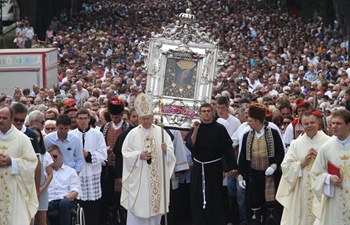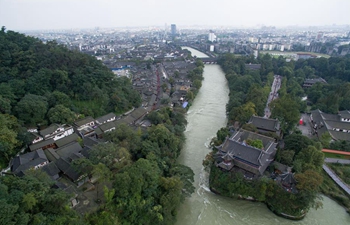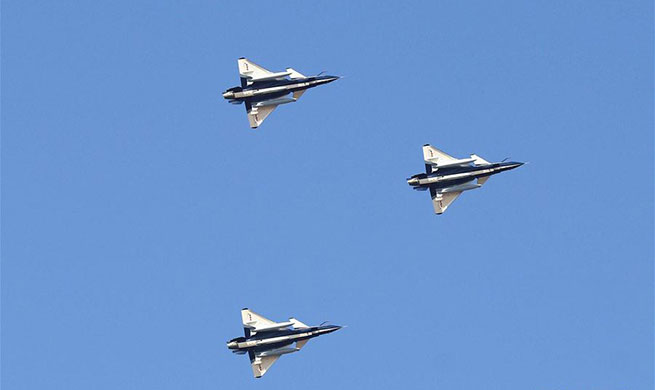BERLIN, Aug. 16 (Xinhua) -- German multinational pharmaceutical and life sciences company Bayer AG officially completed its acquisition of Monsanto on Thursday by fulfilling all requirements set by antitrust regulators in the 63-billion-euro (72-billion-U.S.-dollar) agrochemical industry merger.
The Leverkusen-based company announced it could consequently begin the formal integration of Monsanto as a Bayer subsidiary after already becoming the legal owner of the controversial U.S. seeds company on June 7.
Bayer chief executive officer (CEO) Werner Baumann already announced earlier that "Monsanto will no longer be a company name" following its takeover by Bayer.
In order to meet regulatory requirements, Bayer has now sold business units with combined revenue of 2.2 billion euros to German rival BASF for 7.6 billion euros. The U.S. Department of Justice accepted this step as being sufficient to prevent Bayer-Monsanto from becoming too dominant in any of the markets of the merged entity.
Earlier, the European Commission decided to recognize BASF as an appropriate buyer for all of Bayer's divested units. Under U.S. anti-trust regulations, the formal integration of Monsanto into the corporate structure of Bayer could only commence once the Bayer-BASF deal was complete.
After clearing all regulatory hurdles in the deal, Baumann told press that Bayer would focus on achieving synergy effects anticipated from the merger. The CEO described the takeover as a "strategic milestone" but warned that its success would hinge on "developing a joint corporate culture."
Baumann has said he wants to "double" Bayer's business in the agriculture sector as a result of the corporate fusion with Monsanto. As a result of the deal, Bayer is set to become the world's largest producer of seeds, pesticides, and herbicides, with combined gross revenue of 23 billion euros from agriculture-related business alone.
Even after taking the necessary divestment into account, the new corporate entity will employ a global staff of 115,000. The company expects to achieve annual savings on its earnings before interest, taxes, depreciation and amortization (EBIDTA) of 1.2 billion U.S. dollars due to synergies.
The Bayer-Monsanto merger is not just the largest acquisition made in Bayer's history, but also the most expensive foreign takeover to date conducted by a German company in general. Baumann has emphasized that his company was aware of the "heightened responsibility" which it will shoulder with a globally "leading position in the agricultural sector".
Bayer's share price recently slumped by more than 10 percent in a day following a ruling by a U.S. court that the pesticide "Roundup" produced by Monsanto was the likely cause of cancer in a terminally-ill groundskeeper. Monsanto was ordered to pay a total of 298 million U.S. dollars in damages for selling a carcinogenic weed killer without adequate consumer warning.
Nevertheless, Bayer issued a statement on Thursday which described the court ruling as running "contrary to existing scientific knowledge, as well as practical experiences and assessments of regulatory authorities."
The company highlighted that Monsanto would seek to appeal the decision and expressed confidence that judicial authorities would ultimately reach the verdict that glyphosate -- the main ingredient in Roundup -- was not responsible for the illness suffered by the plaintiff.
Critics of the Bayer-Monsanto merger have repeatedly cautioned that Bayer could suffer damage to its reputation from the move given that Monsanto is mainly known as the producer of the controversial pesticide glyphosate in Europe.













